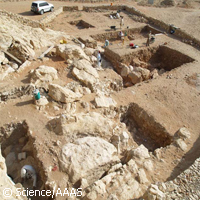Artefacts shed light on modern human journey
Archaeologists have long argued over the presumed date when modern humans first left Africa for the Arabian Peninsula, though most research has until now suggested that an exodus took place around 60,000 years ago. However, artefacts recently unearthed in the United Arab Emirates (UAE) contradict this theory and suggest that humans could have arrived on the Arabian Peninsula directly from Africa as early as 125,000 years ago. This groundbreaking research was recently published in the journal Science. Researchers led by Hans-Peter Uerpmann from Eberhard Karls Universität Tübingen in Germany and Simon Armitage from Royal Holloway, University of London in the UK questioned traditional thinking on the arrival of Africans on the Arabian Peninsula after discovering an ancient human toolkit at the Jebel Faya archaeological site in the UAE. They said the toolkit resembled technology used by early humans in east Africa, but not the craftsmanship that emerged from the Middle East. The toolkit, which includes relatively primitive hand-axes along with a variety of scrapers and perforators, suggested that technological innovation was not necessary for early humans to migrate onto the Arabian Peninsula, according to Dr Armitage. He and his team calculated the age of the stone tools using luminescence dating. This is a relatively new method of dating archaeological sites and materials by measuring the amount of light energy trapped in mineral crystals. They determined that the artefacts were about 100,000 to 125,000 years old, concluding that humans could have arrived on the Arabian Peninsula as early as 125,000 years ago - directly from Africa rather than via the Nile Valley or the Near East, as researchers suggested in past studies. 'These anatomically modern humans - like you and me - had evolved in Africa about 200,000 years ago and subsequently populated the rest of the world,' Dr Armitage says, adding that the findings 'should stimulate a re-evaluation of the means by which we modern humans became a global species'. The passage of modern humans from Africa to the Arabian Peninsula would most likely have been as part of a migration spreading across Europe, Asia and Australia. Dr Uerpmann and his team also analysed sea-level and climate-change records for the region during the last interglacial period, approximately 130,000 years ago. They determined that the Bab al-Mandab Strait, which separates Arabia from the Horn of Africa, would have narrowed due to lower sea-levels, allowing safe passage prior to and at the beginning of the last interglacial period. At that time, the Arabian Peninsula was much wetter than today with greater vegetation cover and a network of lakes and rivers. Such a landscape would have allowed early humans access into Arabia and then into the Fertile Crescent region in Western Asia and India, according to the researchers. 'Archaeology without ages is like a jigsaw with the interlocking edges removed - you have lots of individual pieces of information but you can't fit them together to produce the big picture,' Dr Armitage explains. 'At Jebel Faya, the ages reveal a fascinating picture in which modern humans migrated out of Africa much earlier than previously thought, helped by global fluctuations in sea-level and climate change in the Arabian Peninsula.'For more information, please visit: Science:http://www.sciencemag.org/University in Tübingen:http://www.uni-tuebingen.de/uni/qvr/e-30/m30-01.html
Countries
United Arab Emirates, Germany, United Kingdom



